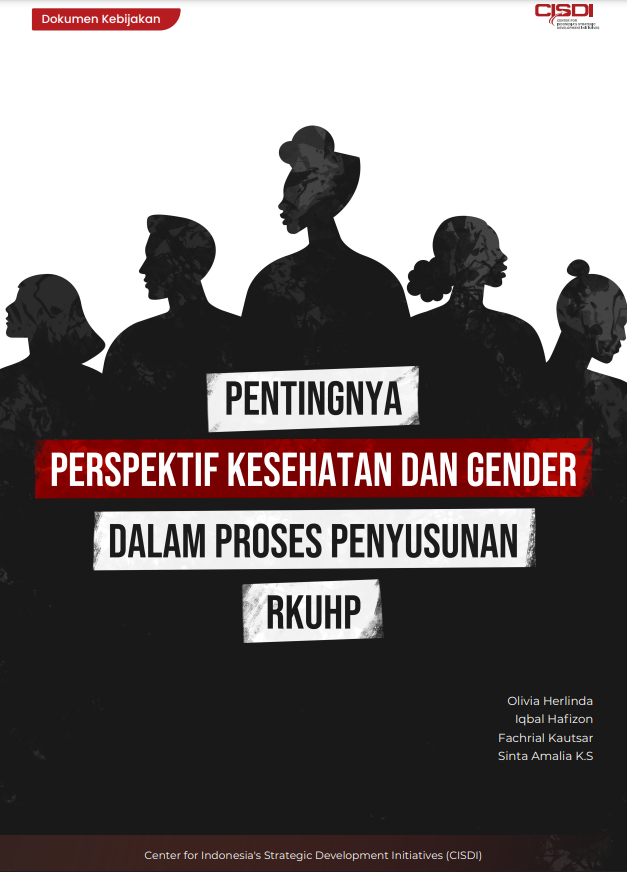
Opinion
The Absence of Health and Gender Perspective in RKUHP, CISDI Reacts
Amru Aginta Sebayang • 18 Agu 2022
Summary > CISDI assesses that the government has not included a health and gender perspective in the drafting process of the Criminal Code (RKUHP). This can be found in several problematic articles.
The Center for Indonesia's Strategic Development Initiatives (CISDI) assesses that the government has not included a health and gender perspective in the drafting process of the Criminal Code (RKUHP). This can be found in several problematic articles.
"Omitting health and gender perspectives has the potential to cause new vulnerabilities for some groups," said Olivia Herlinda, Policy Director of CISDI at the launching of the Policy Document on the Pentingnya Perspektif Kesehatan dan Gender dalam Proses Penyusunan RKUHP (the Importance of Health and Gender Perspectives in the drafting process of the RKUHP) on Friday (19/8). CISDI considers that several articles and provisions tend to be counterproductive to efforts to improve health outcomes and protect vulnerable groups.
First, the risks are counterproductive to improving sexual and reproductive health outcomes. Article 412 prohibits people from “showing”, “offering”, “broadcasting” and “showing” birth control devices to children. Meanwhile, Article 414 paragraph 1 states that only authorized officers or volunteers appointed by authorized officials may carry out reproductive health promotion on the grounds of education and health counseling.
This provision makes it difficult for children and adolescents to receive complete education on sexual and reproductive health. “In fact, reproductive health issues are multidimensional, including the limited number of personnel and services. In the problem of teenage pregnancy, the assistance of many parties is needed to provide education for children and adolescents. In addition, reproductive health education from peers has also proven to be effective for sexual and reproductive health education," said Olivia again.
Second, the increased vulnerability of victims of sexual violence and child marriage practices. Article 415 concerning adultery and article 416 concerning cohabitation have the potential to make victims of violence vulnerable to being reported or complained about. The provisions of article 415, for example, state that anyone who has intercourse with someone who is not a husband or wife can be punished.
"In fact, data from 129 service institutions shows that rape cases are the most dominant form of sexual violence occurring in the realm of personal relations (25%)," said Olivia.
The large number of cases of rape and acts of sexual violence committed by people in personal/close relationships has the potential to place victims in a difficult position and are vulnerable to being reported or complained about using the rubber articles of adultery and cohabitation of the RKUHP.
In addition, there are still loopholes that allow the practice of child marriage to occur due to lax provisions regarding dispensation (granting permission to marry) that parents can apply for. In the body and explanatory articles of Law no. 16 of 2019 regarding marriage, dispensation can be given "with very urgent reasons". But it is not explained in detail what the reason is. Unfortunately, many children are affected and have gone through child marriage after the ratification of the revision of the Marriage Law in 2019 and during the pandemic.
The encouragement of parents and the unequal power relations between parents and children in making decisions related to marriage are the driving factors that make it possible to apply for a dispensation.
Data from Komnas Perempuan (National Commission on Violence against Women) of 2022 shows that the number of child marriage dispensations granted by the religious courts in 2020 reached 64,211 applications. This is an increase of almost 300% from the previous year (23,126 dispensation applications).
“Studies in various countries that criminalize risky sexual behavior also show that the decision of parents to marry their children is an effort that is often taken to avoid stigma and threats of punishment," said Olivia. Criminalizing sexual behavior makes adolescents reluctant to seek and access sexual and reproductive health information and services for fear of being accused of committing a criminal offence.
Based on the notes above, CISDI urges the government and the House of Representative (DPR) to:
- Using a health and gender lens in the formulation of the RKUHP.
- Involve the public in a meaningful and transparent manner in the drafting process of the RKUHP.
- Removing articles 412 and 414 concerning contraceptives and articles 415-416 concerning adultery and cohabitation.
.png)